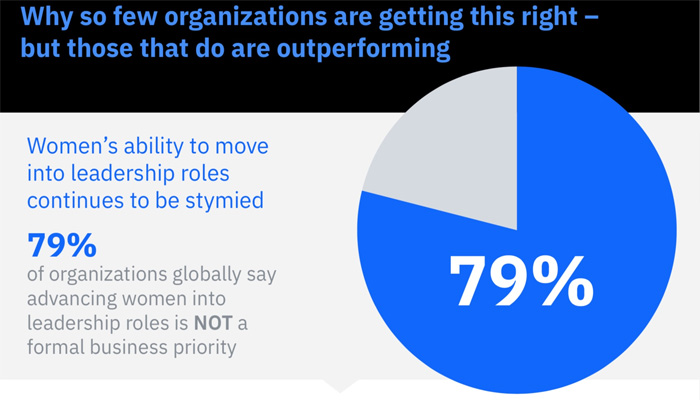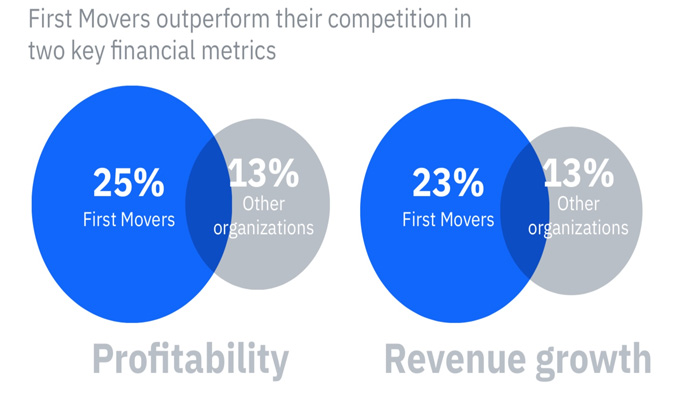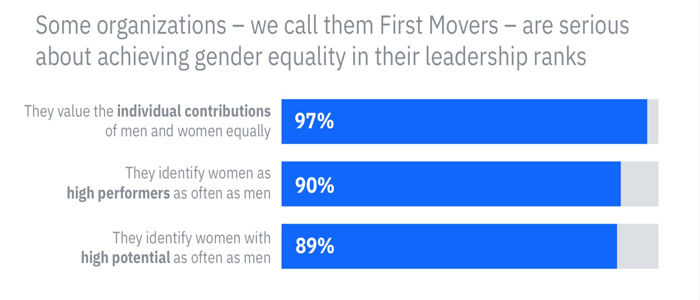The global gender gap in leadership could persist until 2073, unless companies start to prioritise advancing women in the workplace, according to IBM’s latest study, Women, Leadership, and the Priority Paradox.
The report, carried out by the IBM Institute of Business Value, reveals that the leadership gender gap in the workplace continues to persist globally because organisations ‘have yet to make advancing women a formal business priority’.
The study, which interviewed, 2,300 executives and professionals across six global regions, revealed that just 18% of senior leadership positions are held by women. So why are so few firms getting this right?
LAISSEZ-FAIRE APPROACH
For starters, organisations are not sold on the business value, states the report. Around 79% of companies indicated that they have not formally prioritised fostering gender equality in leadership within their organisations, ‘even though ample evidence correlates gender equity with improved financial success and competitive advantage’.

Secondly, men underestimate the magnitude of gender bias in their workplaces. Approximately 65% of male executives reported that ‘it is just as likely they would have been promoted to a top leadership role even if they had been women, despite the low numbers of women that currently hold those roles’.
Lastly, few organisations display a sense of urgency or ownership about this issue, revealed the study. Organisations are over-relying on ‘good intentions and applying a laissez-faire approach to diversity’, rather than ‘applying the disciplined focus on operational execution they apply to other aspects of organisational performance’.
OUTPERFORMING THE COMPETITION
Nevertheless, around 12% of companies, dubbed ‘First Movers’, are successfully prioritising advancing women in the workplace and achieving gender equality within their leadership ranks, the study confirms.
For example, 89% of First Movers identify women as having high potential as often as men and 81% include gender parity as part of their strategic agenda. As a result, First Movers are ‘significantly outperforming’ their competitors in two key financial metrics – profitability and revenue growth.

KEY LESSONS
So what can other companies learn from these First Movers? Firstly, it’s vital to make gender equality in leadership a business priority, states the report. So legitimise your commitment by including the advancement of women in your organisation’s formal business plan with key performance indicators (KPIs), budget and assigned resources, just as you would for any other formal business priority, and select one or more senior executives to lead the charge.
Secondly, create a culture of inclusion. Include gender equality in your organisation’s strategic mission statement and create programmes that support more flexible work arrangements and formal sponsorship initiatives.
Finally, make leadership accountable for gender equality results. After all, it’s the senior executives who truly have the power to make elevating women to leadership positions a key strategic business priority.

A BUSINESS PRIORITY
Thanks to these findings, the report provides key insights into how to create a culture that fosters gender equality in the workplace. “What we have learned from First Movers is the importance of setting measurable goals and defining a systematic approach to inclusion across the organisation,” commented Michelle Peluso, Senior Vice President of Digital Sales and Chief Marketing Officer at IBM. “This means everything from recruiting to rewarding, developing, retaining and promoting women. And, then, we must ourselves be accountable to meet these goals.”
“The opportunity now is to move from inclusion being interesting to being imperative – just like we treat other top business priorities,” she added.
Click here for more information or to download a copy of the full report findings: https://www.ibm.com/thought-leadership/institute-business-value/report/womeninleadership







































